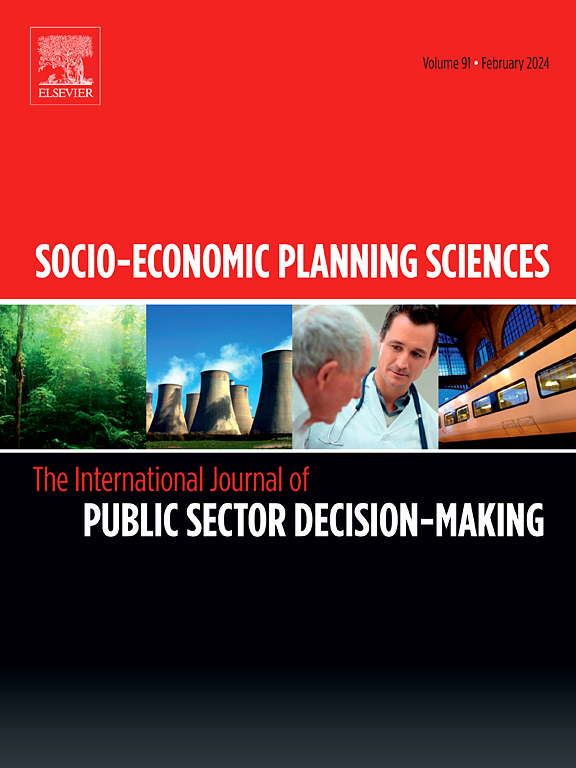A multi-stage machine learning model to design a sustainable-resilient-digitalized pharmaceutical supply chain
IF 6.2
2区 经济学
Q1 ECONOMICS
引用次数: 0
Abstract
The significance of the Pharmaceutical Supply Chain (PSC) has been bolded during the COVID-19 pandemic when the demand for pharmaceutical products has drastically increased. The literature shows that the simultaneous consideration of resilience, sustainability, and digitalization in the PSC network design problem, especially using data-driven approaches, has been ignored by previous works. Hence, the current work aims to cover these gaps by proposing a machine learning-based model to design a PSC with resilience, digitalization, and sustainability dimensions. For this purpose, in the first stage, the potential suppliers are assessed using a Random Forest Regressor (RFR). Afterwards, a mathematical model is developed to design the PSC in which the resilience and sustainability aspects are incorporated. Then, a recently introduced method named Fuzzy Lexicographic Multi-Choice Archimedean-Chebyshev Goal Programming (FLMCACGP) is employed to achieve the optimal solution. To represent the application and efficiency of the developed model, a real-world case study in Iran is examined. It should be noted that the demand for products is estimated using the machine learning approach. Overall, the main novelty of this study is to design a sustainable-resilient-digitalized PSC network using a data-driven model. The model identify the most important indicators for the research problem wherein delivery time, quality, backup supplier, robustness, and cost are the most significant indicators. Furthermore, the proposed mathematical model selects the blockchain-based platform to establish the Information-Sharing System (ISS). The effectiveness of the developed methodology is then assessed by comparing its results with the traditional methods. Finally, managerial insights are offered based on the practical implications of the findings.
一种多阶段机器学习模型,用于设计可持续弹性数字化制药供应链
在COVID-19大流行期间,对药品的需求急剧增加,因此药品供应链(PSC)的重要性得到了体现。文献表明,在PSC网络设计问题中同时考虑弹性、可持续性和数字化,特别是使用数据驱动的方法,被以前的工作所忽略。因此,目前的工作旨在通过提出一种基于机器学习的模型来设计具有弹性、数字化和可持续性维度的PSC,从而弥补这些差距。为此目的,在第一阶段,使用随机森林回归(RFR)对潜在供应商进行评估。然后,开发了一个数学模型来设计PSC,其中弹性和可持续性方面被纳入。然后,采用最近提出的模糊词典多选择阿基米德-切比雪夫目标规划(FLMCACGP)方法求解最优解。为了说明所开发模型的适用性和有效性,本文对伊朗的一个实际案例进行了研究。应该注意的是,对产品的需求是使用机器学习方法来估计的。总体而言,本研究的主要新颖之处在于使用数据驱动模型设计了一个可持续弹性数字化PSC网络。该模型确定了研究问题的最重要指标,其中交货时间、质量、备用供应商、鲁棒性和成本是最重要的指标。此外,所提出的数学模型选择基于区块链的平台来建立信息共享系统(ISS)。然后通过将其结果与传统方法进行比较来评估所开发方法的有效性。最后,根据研究结果的实际意义提供了管理见解。
本文章由计算机程序翻译,如有差异,请以英文原文为准。
求助全文
约1分钟内获得全文
求助全文
来源期刊

Socio-economic Planning Sciences
OPERATIONS RESEARCH & MANAGEMENT SCIENCE-
CiteScore
9.40
自引率
13.10%
发文量
294
审稿时长
58 days
期刊介绍:
Studies directed toward the more effective utilization of existing resources, e.g. mathematical programming models of health care delivery systems with relevance to more effective program design; systems analysis of fire outbreaks and its relevance to the location of fire stations; statistical analysis of the efficiency of a developing country economy or industry.
Studies relating to the interaction of various segments of society and technology, e.g. the effects of government health policies on the utilization and design of hospital facilities; the relationship between housing density and the demands on public transportation or other service facilities: patterns and implications of urban development and air or water pollution.
Studies devoted to the anticipations of and response to future needs for social, health and other human services, e.g. the relationship between industrial growth and the development of educational resources in affected areas; investigation of future demands for material and child health resources in a developing country; design of effective recycling in an urban setting.
 求助内容:
求助内容: 应助结果提醒方式:
应助结果提醒方式:


